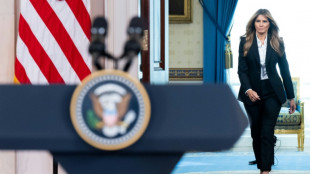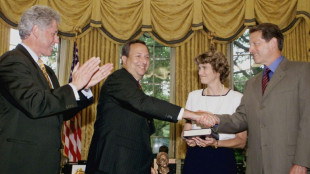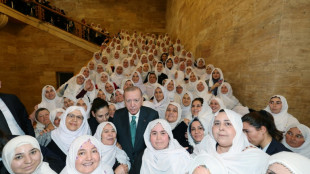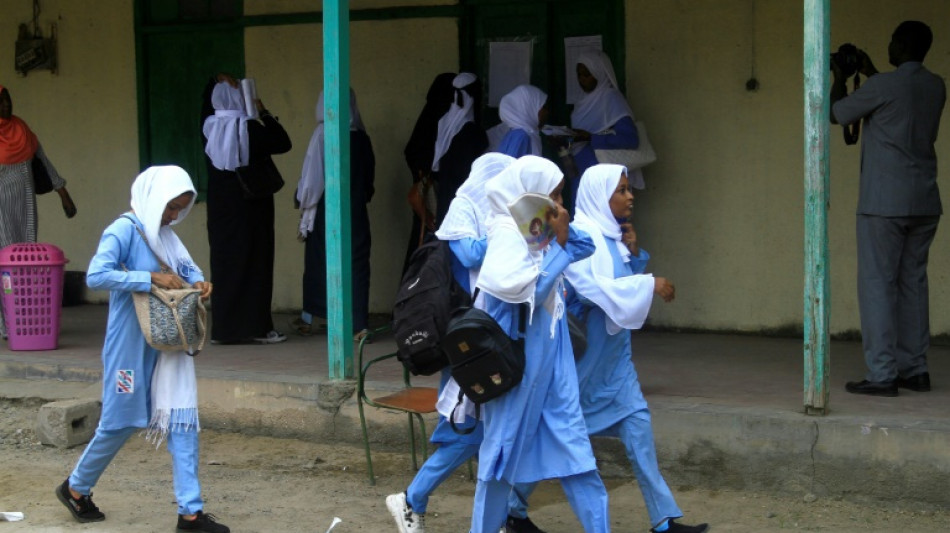
-
 Underdogs Wales could hurt Irish after Scotland display: Popham
Underdogs Wales could hurt Irish after Scotland display: Popham
-
Gilgeous-Alexander rules over Knicks again in Thunder win

-
 Hamilton reveals sequel in the works to blockbuster 'F1: The Movie'
Hamilton reveals sequel in the works to blockbuster 'F1: The Movie'
-
Alonso, Stroll fear 'permanent nerve damage' from vibrating Aston Martin

-
 China boosts military spending with eyes on US, Taiwan
China boosts military spending with eyes on US, Taiwan
-
Seoul leads rebound across Asian stocks, oil extends gains

-
 Tourism on hold as Middle East war casts uncertainty
Tourism on hold as Middle East war casts uncertainty
-
Bayern and Kane gambling with house money as Gladbach come to town

-
 Turkey invests in foreign legion to deliver LA Olympics gold
Turkey invests in foreign legion to deliver LA Olympics gold
-
Galthie's France blessed with unprecedented talent: Saint-Andre

-
 Voice coach to the stars says Aussie actors nail tricky accents
Voice coach to the stars says Aussie actors nail tricky accents
-
Rahm rejection of DP World Tour deal 'a shame' - McIlroy

-
 Israel keeps up Lebanon strikes as ground forces advance
Israel keeps up Lebanon strikes as ground forces advance
-
China prioritises energy and diplomacy over Iran support

-
 Canada PM Carney says can't rule out military participation in Iran war
Canada PM Carney says can't rule out military participation in Iran war
-
Verstappen says new Red Bull car gave him 'goosebumps'

-
 Swiss to vote on creating giant 'climate fund'
Swiss to vote on creating giant 'climate fund'
-
Google to open German centre for 'AI development'

-
 Winter Paralympics to start with icy blast as Ukraine lead ceremony boycott
Winter Paralympics to start with icy blast as Ukraine lead ceremony boycott
-
Sci-fi without AI: Oscar nominated 'Arco' director prefers human touch

-
 Ex-guerrillas battle low support in Colombia election
Ex-guerrillas battle low support in Colombia election
-
'She's coming back': Djokovic predicts Serena return

-
 Hamilton vows 'no holding back' in his 20th Formula One season
Hamilton vows 'no holding back' in his 20th Formula One season
-
Two-thirds of Cuba, including Havana, hit by blackout

-
 US sinks Iranian warship off Sri Lanka as war spreads
US sinks Iranian warship off Sri Lanka as war spreads
-
After oil, US moves to secure access to Venezuelan minerals

-
 Arteta hits back at Brighton criticism after Arsenal boost title bid
Arteta hits back at Brighton criticism after Arsenal boost title bid
-
Carrick says 'defeat hurts' after first loss as Man Utd boss

-
 Ecuador expels Cuba envoy, rest of mission
Ecuador expels Cuba envoy, rest of mission
-
Arsenal stretch lead at top of Premier League as Man City falter

-
 Title race not over vows Guardiola after Man City held by Forest
Title race not over vows Guardiola after Man City held by Forest
-
Rosenior hails 'world class' Joao Pedro after hat-trick crushes Villa

-
 Brazil ratifies EU-Mercosur trade deal
Brazil ratifies EU-Mercosur trade deal
-
Real Sociedad edge rivals Athletic to reach Copa del Rey final

-
 Chelsea boost top four push as Joao Pedro treble routs Villa
Chelsea boost top four push as Joao Pedro treble routs Villa
-
Leverkusen sink Hamburg to keep in touch with top four

-
 Love match: WTA No. 1 Sabalenka announces engagement
Love match: WTA No. 1 Sabalenka announces engagement
-
Man City falter as Premier League leaders Arsenal go seven points clear

-
 Man City title bid rocked by Forest draw
Man City title bid rocked by Forest draw
-
Defending champ Draper ready to ramp up return at Indian Wells

-
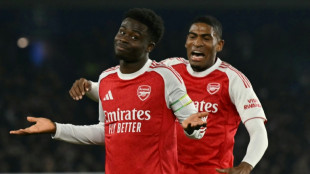 Arsenal extend lead in title race after Saka sinks Brighton
Arsenal extend lead in title race after Saka sinks Brighton
-
US, European stocks rise as oil prices steady; Asian indexes tumble

-
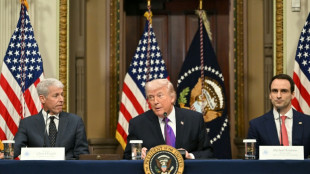 Trump rates Iran war as '15 out of 10'
Trump rates Iran war as '15 out of 10'
-
Nepal votes in key post-uprising polls
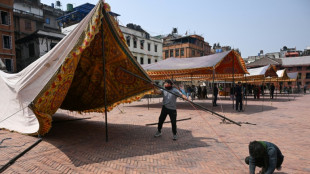
-
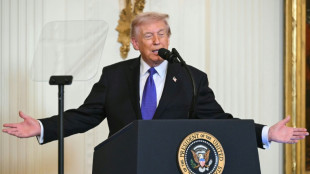 US Fed warns 'economic uncertainty' weighing on consumers
US Fed warns 'economic uncertainty' weighing on consumers
-
Florida family sues Google after AI chatbot allegedly coached suicide

-
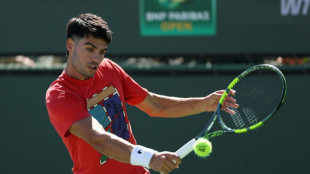 Alcaraz unbeaten run under threat from Sinner, Djokovic at Indian Wells
Alcaraz unbeaten run under threat from Sinner, Djokovic at Indian Wells
-
Iran's supreme leader gone, but opposition still at war with itself
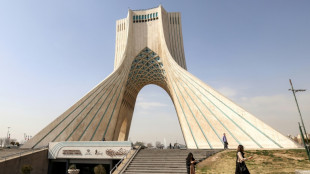
-
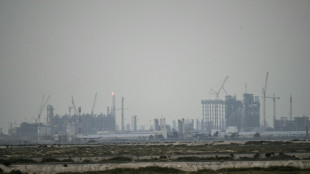 Mideast war rekindles European fears over soaring gas prices
Mideast war rekindles European fears over soaring gas prices
-
'Miracle to walk' says golfer after lift shaft fall


In war-torn Sudan, a school offers a second chance at education
In a worn-down classroom in eastern Sudan, men and women watch attentively from a wood bench as a teacher scribbles Arabic letters on a faded blackboard.
Nodding approvingly in the corner is the school's 63-year-old founder Amna Mohamed Ahmed, known to most as "Amna Oor", which partly means lion in the Beja language of eastern Sudan.
She has spent the last three decades helping hundreds return to their education in Port Sudan, now the country's de facto capital.
The educator, who wears an orange headscarf wrapped neatly around her head, said she started the project in 1995 because of widespread illiteracy in her community.
"That's what pushed me to act. People wanted to learn -- if they didn't, they wouldn't have kept coming," she told AFP.
Ahmed's classes offer a second chance to those who missed out on formal education, particularly women who were denied schooling due to cultural or financial barriers.
- A fresh start -
For 39-year-old Nisreen Babiker, going back to school has been a long-held dream.
She left school in 2001 after marrying and taking on the responsibility of raising her younger siblings following her father's death.
"My siblings grew up and studied, and my children too," she said.
"I felt the urge to return to school. Even after all these years, it feels like I'm starting fresh," she told AFP.
Ahmed's school has also become a haven for those displaced by Sudan's ongoing conflict, which erupted in April 2023 between army chief Abdel Fattah al-Burhan and his former deputy Mohamed Hamdan Daglo, who leads the paramilitary Rapid Support Forces (RSF).
The war has killed tens of thousands, uprooted over 12 million, and driven swathes of the country into hunger and famine.
Maria Adam is among those who fled their homes after war broke out. She arrived in Port Sudan seeking safety and a better future.
"When I arrived in Port Sudan, I heard about this place and joined," said the 28-year-old, noting that she dropped out of school when she was 11.
- Changing lives -
"I want to finish my education so I can help my children," Adam told AFP.
Sudan's education system has been shattered by the conflict, with the United Nations estimating that over 90 percent of the country's 19 million school-age children now have no access to formal learning.
Across the nation, most classrooms have been converted into shelters for displaced families.
Even before the war, a 2022 Save the Children analysis ranked Sudan among the countries most at risk of educational collapse.
But the determination to learn remains strong at the Port Sudan school, where many students have gone on to enter high school and some have even graduated from university.
In one corner of the classroom, a mother joins her young son in a lesson, hoping to reshape both their futures.
"To watch someone go from not knowing how to read or write to graduating from university, getting a job, supporting their family -- that is what keeps me going," Ahmed said.
"They go from being seen as a burden to becoming productive, educated members of society," she added.
T.Ziegler--VB

